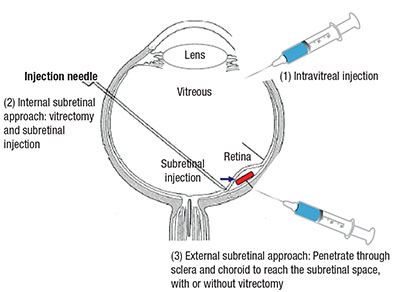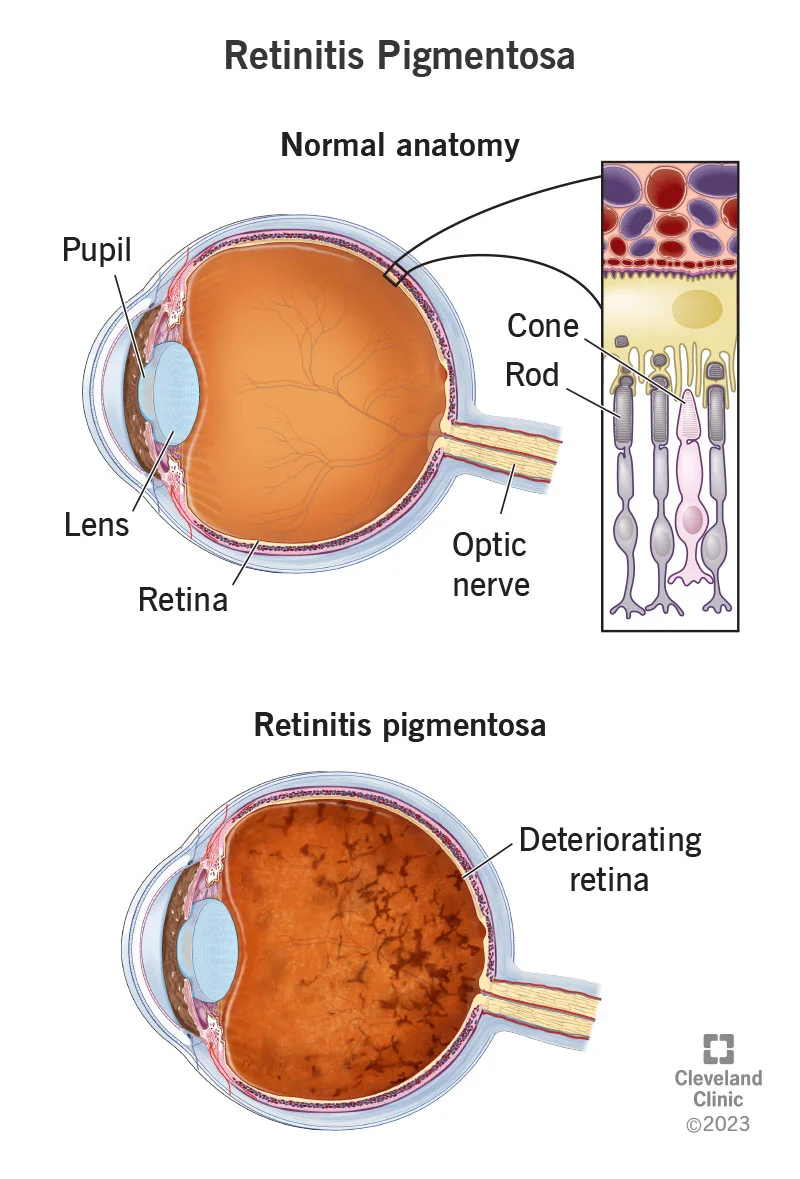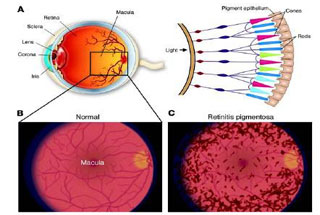Retinitis Pigmentosa Treatment in India

Managing Retinitis Pigmentosa: Stem Cell Treatment Options and Lifestyle Changes
Stem cell treatment for Retinitis Pigmentosa in India has emerged as a promising and innovative approach. This therapy involves the use of stem cells to regenerate and repair damaged retinal cells, potentially restoring lost vision and improving overall retinal function.
Stem cells used in this therapy can be obtained from a variety of sources, including the patient’s own body or from donors. The effectiveness of stem cell therapy for RP is still being researched, and clinical trials are ongoing to evaluate its efficacy. Nonetheless, the potential of stem cell therapy to revolutionize the retinitis pigmentosa treatment in India and other retinal disorders makes it an exciting area of research and development.
In the restoration of vision for retinitis pigmentosa (RP), one approach is cell replacement. The outer retinal photoreceptor layer loss is the usual cause of visual loss, so therapeutic timing should be at this stage of the disease. Another approach is gene therapy for retinitis pigmentosa, cost of which is as high as $900000.
Stem cell therapy is a medical procedure that involves the administration of a minimally invasive intravitreal injection to improve both vision and retinal function. By introducing stem cells into the affected area, this therapy aims to repair damaged or diseased retinal cells and stimulate the growth of new, healthy cells. This innovative approach has shown promise in the field of ophthalmology and may be beneficial for individuals with retinal conditions and as one of the Best Retinitis Pigmentosa Treatment in India.

What is Retinitis Pigmentosa?
Retinitis Pigmentosa (RP) is an inherited eye disease that is characterized by a progressive loss of photoreceptor cells, leading to a gradual decline in vision. While RP may present in infancy, it typically manifests in early adulthood with the initial symptom being night blindness or nyctalopia.
This is followed by a loss of peripheral vision and ultimately a loss of fine central vision as the photoreceptors in the macula become damaged. Morphologically, retinas affected by RP are characterized by the centripetal proliferation of bone spicule-like pigmentation, a thinning of the retinal blood vessels, and optic nerve pallor.
The majority of individuals with RP experience low vision, with some progressing to complete blindness. The severity of vision loss in RP is influenced by various factors, including the specific gene mutation causing the condition, the age of onset, and the rate of disease progression. As such,retinitis pigmentosa cure requires an individualized approach tailored to the specific needs and circumstances of each patient.
What are Retinitis Pigmentosa causes?
Retinitis Pigmentosa (RP) is one of several Inherited Retinal Disorders (IRDs) that result from genetic mutations affecting the cells that make up the retina. These mutations alter the function of the genes responsible for maintaining the structure and integrity of the retina, leading to progressive degeneration and eventual vision loss.
The specific genes implicated in RP can vary between individuals, and genetic testing is often utilized to identify the underlying cause of the condition. Understanding the genetic basis is crucial for developing targeted treatments for retinitis pigmentosa and advancing our knowledge of this complex disorder as said by the best doctor for retinitis pigmentosa.
What are the Signs and Symptoms of Retinitis Pigmentosa?
They can be divided into initial and later signs and symptoms.
1) Difficulty in Night vision (Nyctalopia)
2) An impaired ability to see in low-light
3) Affected individuals may also experience blind spots in their peripheral (side) vision, which can progress over time and lead to central vision loss.
It is important to be vigilant of these early signs and symptoms and seek prompt medical attention for early diagnosis and retinitis pigmentosa treatment.
1. A sensation of twinkling or flashing lights (Photopsia)
2. Tunnel vision, which is characterized by the loss of peripheral vision and the preservation of only central vision.
3. Additionally, RP patients may become sensitive to or uncomfortable in bright light (photophobia),
4. Lose the ability to see colors (Color blindness)
5. And ultimately develop very low vision.
It is crucial for individuals experiencing these symptoms to seek specialized medical care and explore all available Retinitis Pigmentosa treatment in India.

Understanding the Diagnostic Process for Retinitis Pigmentosa
Analyzing a blood or tissue sample for specific genes associated with the disease and predicting its severity and course.
Measuring the retina’s electrical activity in response to light, similar to an EKG for the heart.
Assessing peripheral vision and detecting any developing blind spots.
Capturing highly detailed images of the retina.
Let Our Patient Speak For Us
I am chandrakant patil from kolhapur since last two years I notice that I am unable to see clearly and excessive watering of my eyes with the days going by my vision started delineating rapidly eye Doctor told me that glucoma has affected your eyes and optic nerve are shrinking day by day I heard about stemcell therapy from some doctors. I decided to use stemcell to regain my vision. after taking 4 dose of stemcells
my vision improved and I could see the object easily thank you Doctor.

OPTIC NERVE
I am Naresh kumar 45 yrs old Working as IT professionalist from UP. After covid day by day going by my vision blur And unable to see clearly . after consulting with eye doctor i am diagnosed with optic nerve atrophy doctor told no treatment available for optic nerve shrinking day by day . but my office staff told me about stem-cell treatment.i decided to take stemcell treatment in pune specialty doctor for stemcells. after taking 4 doses of stemcell regain my vision in 3-4 month .i can see object clearly thank you


